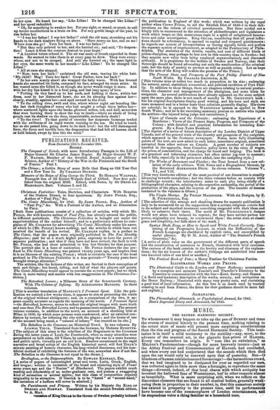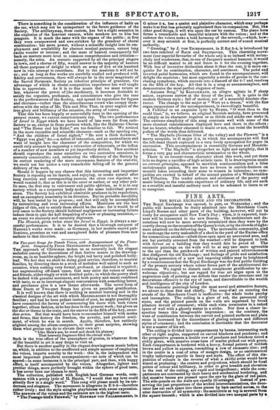MUSIC.
THE SACRED HARMONIC SOCIETY.
To whomsoever it may happen to take up the pen of BURNEY and trace the events of musical history to the present time, nothing relating to the actual state of music will present more surprising considerations than the rise and progress of the Sacred Harmonic Society. This insti- tution is in itself a solid testimony to the stability—nay, more, to the advance of the musical art, in the gigantic foot-prints of HANDEL. Every one remembers its origin. It " rose like an exhalation," as MILTON'S Pandemonium—though for more heavenly intents—just as the Abbey Festival and Commemoration of HANDEL had concluded, and when every one had conjectured that the sounds which then died upon the ear would only be renewed upon that of posterity. But-0 blindness of human calculations and foreseeings !—the harmonious crowd, that we had imagined to be dissipated for ever as regarded our ears, was collected again in little more than a fortnight, to reproduce the same things—divested, indeed, of that local charm with which antiquity has invested the hallowed fane of Westminster, but' in other respects almost as beautifully. What is more surprising still, when we reflect on the discordant elements that are found in all musical bodies, generally weak- ening them in proportion to their number, is, that this numerous society has existed in prosperity to the present time, until its performances have become one of the commonplaces of London entertainment, and its stupendous voice a thing familiar as a household tone.
There is something in the consideration of the influence of habit on the ear, which may not be unimportant to the future guidance of the Society. The artilleryman, from custom, has but a slight sensation in the explosion of the heaviest cannon, while muskets are to him but popguns. It is much the same with the organs of the public : at first they were overpowered and awe-stricken by the grandeur of choral combination : but mere power, without a scientific insight into its em- ployment and availability for abstract musical purposes, cannot long excite wonder or interest ; and the mass of hearers consequently fall back on matters more level to common comprehension and criticism— namely, the solos. An oratorio supported by all the principal singers in town, and a chorus of fifty, would answer to the majority of hearers all those purposes of delight to which an army of five or six hundred now in vain attempt to contribute. But to the musician it will not be so ; and as long as fine works are carefully studied and produced with fidelity and correctness, there will always be in the mere magnitude of the Sacred Harmonic Society an inherent principle of grandeur, the advantage of which in choral composition experience has well taught
bim to appreciate. As it is to fine music that we must return at last, whatever the power of [the machinery, it becomes desirable to satisfy the organists, professors, and connoisseurs who give the tone to the performances of the Society, and spread its reputation for fugues and choruses—rather than the miscellaneous crowd who occupy them- selves with the solos of Mr. This and Miss That, in utter neglect of the true glory and brilliancy of the occasion, the array of voices. That this has been happily or successfully done in the opening of the present season, we cannot conscientiously say. The two performances of Israel in Egypt which we have heard of late were far from satis- factory to us, except in those portions which, like the Hailstone Chorus and " The Horse and his Rider," are too familiar to fail. We noticed in the more recondite and scientific choruses—such as the opening one, " And the children of Israel sighed," " He sent a thick darkness," "Egypt was glad," &c.—a defect of intonation, and an unsteadiness and want of insight into the character of the composition, for which we could only account by supposing a relaxation of rehearsals, or the influx of a number of new members as yet imperfectly drilled. That accident should reproduce the same casualties on two successive occasions, is scarcely conceivable ; and, estimating the efficiency of the Society by its correct rendering of the more uncommon features of the oratorio, we could not but notice a very remarkable falling-off in the general delivery of the work. Should it happen by any chance that this interesting and important Society is reposing on its laurels, and enjoying, as seems natural after long exertion and corresponding success, the otium cum dignitate, we would remind it, that as this is in the actor or author, or any other pub- lic man, the first step to retirement and public oblivion, so it is in any society which as a corporate body makes the same individual preten- sions. The Society has exhibited admirable prudence in its regulations, and an exemplary unanimity in its direction. But its probable durability will be best tested by its progress; and that will only be accomplished by unremitting and even increasing efforts. Musicians are the best judges of this, and to satisfy them should be the aim : for it would be of evil omen to the Society should habitual negligence or increasing failure induce them to quit the hall despairing of a new or pleasing sensation,— an event we sincerely and earnestly deprecate.
The Messiah, given twice since the Israel in Egypt, is always a suc- cessful performance. It is to be desired that a thorough conquest of HANDEL'S works were made ; as Germany, in her modern sacred pub- lications, promises us vast and unexplored fields of pleasure from new authors in that direction.



























 Previous page
Previous page